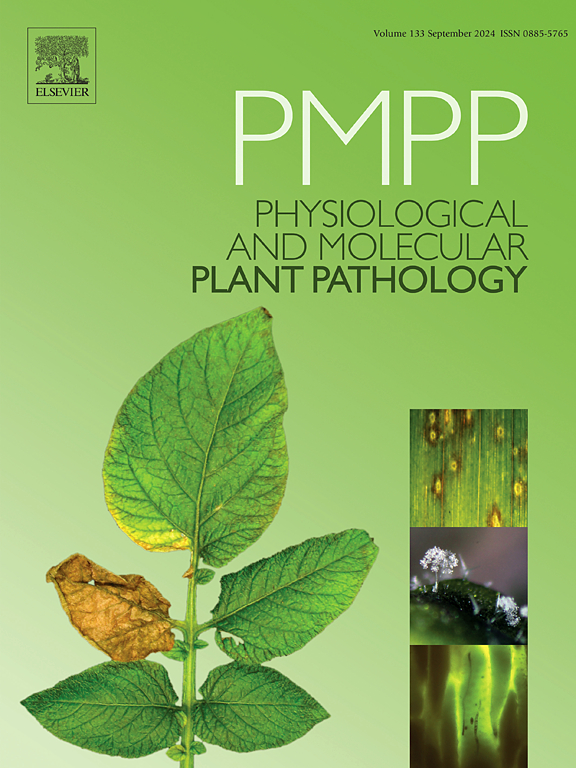植物源性γ -氨基丁酸(GABA):在应激反应、生长、代谢和神经精神疾病治疗潜力中的作用
IF 2.8
3区 农林科学
Q2 PLANT SCIENCES
引用次数: 0
摘要
γ -氨基丁酸(GABA)是一种非蛋白质的四碳氨基酸。GABA作为信号分子在植物发育中的作用作为中枢神经系统的抑制性神经递质,通过三羧酸循环(TCA)参与植物代谢。除了其一般的生理作用,GABA在植物中作为一个关键的信号分子,调节胁迫反应、生长和初级代谢。除了其生理作用外,GABA也是神经递质相关疾病(如焦虑)药物治疗的关键靶点,强调了其在生物学和治疗应用中的重要性。在本综述中,最初确定了1500项研究,经过双重筛选,484项符合纳入标准。最终,99项关于代谢和治疗方面的研究被纳入综述。这些研究阐述了植物源GABA治疗药物的作用和应用。GABA是一种重要的植物信号分子,影响花粉管伸长、果实成熟、根系生长和种子萌发等过程。它的积累是由于环境压力和病原体和昆虫的攻击。GABA浓度升高可增强植物的胁迫反应,从而改善光合作用,调节干旱条件下的气孔开放,并激活抗氧化酶。虽然目前的抗焦虑药物是有效的,但它们往往与不良反应有关。在这种情况下,植物衍生的植物化学物质,特别是GABA,由于其神经调节特性,正在被研究作为潜在的替代品,这表明GABA可能作为一种有希望的焦虑治疗药物。本文章由计算机程序翻译,如有差异,请以英文原文为准。

Plant-derived gamma-aminobutyric acid (GABA): Role in stress responses, growth, metabolism, and therapeutic potential for neuropsychiatric disorders
Gamma-aminobutyric acid (GABA) is a four-carbon amino acid that is non-protein. GABA functions as a signaling molecule in plant development & as an inhibitory neurotransmitter in the central nervous system alongside participating in plant metabolism through the tricarboxylic acid cycle (TCA). Beyond its general physiological roles, GABA functions as a key signaling molecule in plants, regulating stress responses, growth, and primary metabolism. Beyond its physiological roles, GABA is a key target in pharmacotherapies for neurotransmitter-related disorders like anxiety, emphasizing its importance in biological and therapeutic applications. In this review, 1500 studies were initially identified, and 484 met the inclusion criteria after the double screening process. Ultimately, 99 studies focusing on the metabolic and therapeutic aspects were incorporated in the review. These studies addressed the roles and applications of GABA therapeutics derived from plants. GABA, a vital plant signaling molecule, influences processes like the elongation of pollen tubes, fruit ripening, root growth, and seed germination. Its accumulation occurs due to environmental stresses and attacks from pathogens and insects. Increased GABA concentrations in plants enhance stress responses, leading to improved photosynthesis, regulated stomatal opening in drought conditions, and activation of antioxidant enzymes. Although current anxiolytic drugs are effective, they are often associated with adverse effects. In this context, plant-derived phytochemicals, particularly GABA, are being investigated as potential alternatives due to their neuromodulatory properties, indicating that GABA may serve as a promising therapeutic agent for anxiety management.
求助全文
通过发布文献求助,成功后即可免费获取论文全文。
去求助
来源期刊
CiteScore
4.30
自引率
7.40%
发文量
130
审稿时长
38 days
期刊介绍:
Physiological and Molecular Plant Pathology provides an International forum for original research papers, reviews, and commentaries on all aspects of the molecular biology, biochemistry, physiology, histology and cytology, genetics and evolution of plant-microbe interactions.
Papers on all kinds of infective pathogen, including viruses, prokaryotes, fungi, and nematodes, as well as mutualistic organisms such as Rhizobium and mycorrhyzal fungi, are acceptable as long as they have a bearing on the interaction between pathogen and plant.

 求助内容:
求助内容: 应助结果提醒方式:
应助结果提醒方式:


